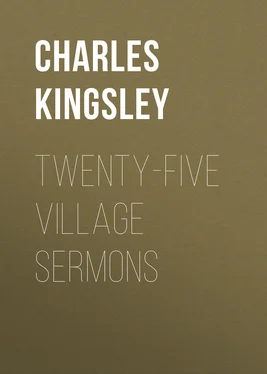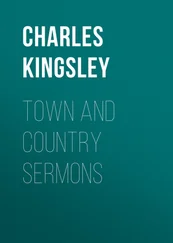Charles Kingsley - Twenty-Five Village Sermons
Здесь есть возможность читать онлайн «Charles Kingsley - Twenty-Five Village Sermons» — ознакомительный отрывок электронной книги совершенно бесплатно, а после прочтения отрывка купить полную версию. В некоторых случаях можно слушать аудио, скачать через торрент в формате fb2 и присутствует краткое содержание. Жанр: foreign_prose, foreign_religion, Философия, foreign_psychology, foreign_antique, на английском языке. Описание произведения, (предисловие) а так же отзывы посетителей доступны на портале библиотеки ЛибКат.
- Название:Twenty-Five Village Sermons
- Автор:
- Жанр:
- Год:неизвестен
- ISBN:нет данных
- Рейтинг книги:4 / 5. Голосов: 1
-
Избранное:Добавить в избранное
- Отзывы:
-
Ваша оценка:
- 80
- 1
- 2
- 3
- 4
- 5
Twenty-Five Village Sermons: краткое содержание, описание и аннотация
Предлагаем к чтению аннотацию, описание, краткое содержание или предисловие (зависит от того, что написал сам автор книги «Twenty-Five Village Sermons»). Если вы не нашли необходимую информацию о книге — напишите в комментариях, мы постараемся отыскать её.
Twenty-Five Village Sermons — читать онлайн ознакомительный отрывок
Ниже представлен текст книги, разбитый по страницам. Система сохранения места последней прочитанной страницы, позволяет с удобством читать онлайн бесплатно книгу «Twenty-Five Village Sermons», без необходимости каждый раз заново искать на чём Вы остановились. Поставьте закладку, и сможете в любой момент перейти на страницу, на которой закончили чтение.
Интервал:
Закладка:
LIFE AND DEATH
“O Lord, how manifold are Thy works! in wisdom hast Thou made them all: the earth is full of Thy riches. That Thou givest them they gather: Thou openest Thine hand, they are filled with good. Thou hidest Thy face, they are troubled: Thou takest away their breath, they die, and return to their dust. Thou sendest forth Thy spirit, they are created: and Thou renewest the face of the earth.”
I had intended to go through this psalm with you in regular order; but things have happened this parish, awful and sad, during the last week, which I was bound not to let slip without trying to bring them home to your hearts, if by any means I could persuade the thoughtless ones among you to be wise and consider your latter end:—I mean the sad deaths of various of our acquaintances. The death-bell has been tolled in this parish three times, I believe, in one day—a thing which has seldom happened before, and which God grant may never happen again. Within two miles of this church there are now five lying dead. Five human beings, young as well as old, to whom the awful words of the text have been fulfilled: “Thou takest away their breath, they die, and return to their dust.” And the very day on which three of these deaths happened was Ascension-day—the day on which Jesus, the Lord of life, the Conqueror of death, ascended upon high, having led captivity captive, and became the first-fruits of the grave, to send down from the heaven of eternal life the Spirit who is the Giver of life. That was a strange mixture, death seemingly triumphant over Christ’s people on the very day on which life triumphed in Jesus Christ Himself. Let us see, though, whether death has not something to do with Ascension-day. Let us see whether a sermon about death is not a fit sermon for the Sunday after Ascension-day. Let us see whether the text has not a message about life and death too—a message which may make us feel that in the midst of life we are in death, and that yet in the midst of death we are in life; that however things may seem , yet death has not conquered life, but life has conquered and will conquer death, and conquer it most completely at the very moment that we die, and our bodies return to their dust.
Do I speak riddles? I think the text will explain my riddles, for it tells us how life comes, how death comes. Life comes from God: He sends forth His spirit, and things are made, and He renews the face of the earth. We read in the very two verses of the book of Genesis how the Spirit of God moved upon the face of the waters the creation, and woke all things into life. Therefore the Creed well calls the Holy Ghost, the Spirit of God, that is—the Lord and Giver of life. And the text tells us that He gives life, not only to us who have immortal souls, but to every thing on the face of the earth; for the psalm has been talking all through, not only of men, but of beasts, fishes, trees, and rivers, and rocks, sun and moon. Now, all these things have a life in them. Not a life like ours; but still you speak rightly and wisely when you say, ‘That tree is alive, and, That tree is dead. That running water is live water—it is sweet and fresh, but if it is kept standing it begins to putrefy, its life is gone from it, and a sort of death comes over it, and makes it foul, and unwholesome, and unfit to drink.’ This is a deep matter, this, how there is a sort of life in every thing, even to the stones under our feet. I do not mean, of course, that stones can think as our life makes us do, or feel as the beasts’ life makes them do, or even grow as the trees’ life makes them do; but I mean that their life keeps them as they are, without changing or decaying. You hear miners and quarrymen talk very truly of the live rock. That stone, they say, was cut out of the live rock, meaning the rock as it is under ground, sound and hard—as it would be, for aught we know, to the end of time, unless it was taken out of the ground, out of the place where God’s Spirit meant it to be, and brought up to the open air and the rain, in which it is not its nature to be. And then you will see that the life of the stone begins to pass from it bit by bit, that it crumbles and peels away, and, in short, decays and is turned again to its dust. Its organisation, as it is called, or life, ends, and then—what? does the stone lie for ever useless? No! And there is the great blessed mystery of how God’s Spirit is always bringing life out of death. When the stone is decayed and crumbled down to dust and clay, it makes soil —this very soil here, which you plough, is the decayed ruins of ancient hills; the clay which you dig up in the fields was once part of some slate or granite mountains, which were worn away by weather and water, that they might become fruitful earth. Wonderful! but any one who has studied these things can tell you they are true. Any one who has ever lived in mountainous countries ought to have seen the thing happen, ought to know that the land in the mountain valleys is made at first, and kept rich year by year, by the washings from the hills above; and this is the reason why land left dry by rivers and by the sea is generally so rich. Then what becomes of the soil? It begins a new life. The roots of the plants take it up; the salts which they find in it—the staple, as we call them—go to make leaves and seed; the very sand has its use, it feeds the stalks of corn and grass, and makes them stiff. The corn-stalks would never stand upright if they could not get sand from the soil. So what a thousand years ago made part of a mountain, now makes part of a wheat-plant; and in a year more the wheat grain will have been eaten, and the wheat straw perhaps eaten too, and they will have died —decayed in the bodies of the animals who have eaten them, and then they will begin a third new life—they will be turned into parts of the animal’s body—of a man’s body. So that what is now your bone and flesh, may have been once a rock on some hillside a hundred miles away.
Strange, but true! all learned men know that it is true. You, if you think over my words, may see that they are at least reasonable. But still most wonderful! This world works right well, surely. It obeys God’s Spirit. Oh, my friends, if we fulfilled our life and our duty as well as the clay which we tread on does,—if we obeyed God’s Spirit as surely as the flint does, we should have many a heartache spared us, and many a headache too! To be what God wants us!—to be men , to be women , and therefore to live as children of God, members of Christ, fulfilling our duty in that state to which God has called us, that would be our bliss and glory. Nothing can live in a state in which God did not intend it to live. Suppose a tree could move itself about like an animal, and chose to do so, the tree would wither and die; it would be trying to act contrary to the law which God has given it. Suppose the ox chose to eat meat like the lion, it would fall sick and die; for it would be acting contrary to the law which God’s Spirit had made for it—going out of the calling to which God’s Word has called it, to eat grass and not flesh, and live thereby. And so with us: if we will do wickedly, when the will of God, as the Scripture tells us, is our sanctification, our holiness; if we will speak lies, when God’s law for us is that we should speak truth; if we will bear hatred and ill-will, when God’s law for us is, Love as brothers,—you all sprang from one father, Adam,—you were all redeemed by one brother, Jesus Christ; if we will try to live as if there was no God, when God’s law for us is, that a man can live like a man only by faith and trust in God;—then we shall die , if we break God’s laws according to which he intended man to live. Thus it was with Adam; God intended him to obey God, to learn every thing from God. He chose to disobey God, to try and know something of himself, by getting the knowledge of good and evil; and so death passed on him. He became an unnatural man, a bad man, more or less, and so he became a dead man; and death came into the world, that time at least, by sin, by breaking the law by which man was meant to be a man. As the beasts will die if you give them unnatural food, or in any way prevent their following the laws which God has made for them, so man dies, of necessity. All the world cannot help his dying, because he breaks the laws which God has made for him.
Читать дальшеИнтервал:
Закладка:
Похожие книги на «Twenty-Five Village Sermons»
Представляем Вашему вниманию похожие книги на «Twenty-Five Village Sermons» списком для выбора. Мы отобрали схожую по названию и смыслу литературу в надежде предоставить читателям больше вариантов отыскать новые, интересные, ещё непрочитанные произведения.
Обсуждение, отзывы о книге «Twenty-Five Village Sermons» и просто собственные мнения читателей. Оставьте ваши комментарии, напишите, что Вы думаете о произведении, его смысле или главных героях. Укажите что конкретно понравилось, а что нет, и почему Вы так считаете.












